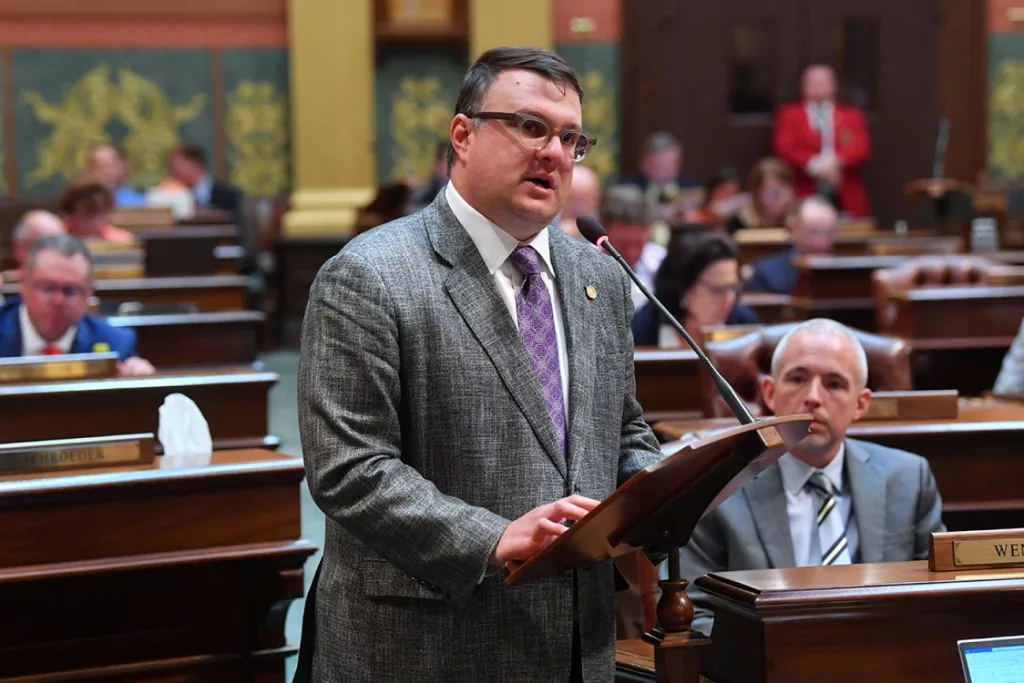The Michigan Legislature will have a new look to it starting next week. Democrats will control both houses for the first time in decades, coupled with their control of the governor’s chair via second term incumbent Governor Gretchen Whitmer. Whether it means new ground that’s fertile for compromise, or a battleground over past disagreements remains to be seen.
However, one thing we know is that there will be new leadership in the Majority and Minority caucuses in both Statehouse chambers. BridgeMichigan, the non-profit, non-partisan newsroom in Lansing is taking an in-depth look at the four lawmakers who are preparing to lead their parties in the Legislature over the next two years. MoodyOnTheMarket.com is presenting these profiles over two days as a service to readers.
MICHIGAN HOUSE MINORITY LEADER MATT HALL, R-COMSTOCK TOWNSHIP
Rep. Matt Hall had hoped to succeed outgoing Republican Rep. Jason Wentworth as the next Michigan House speaker in 2023. Instead, he’ll lead a slightly slimmed-down caucus after Democrats won the legislative majority in November.
But the Comstock Township Republican isn’t letting the changing of the guard get him down as he looks to the new session starting in January, telling Bridge Michigan he will be a “strong, effective Republican leader who can balance all the different complexities of our party.”
SPONSOR
Rep. Joe Tate, D-Detroit, was elected to serve as House speaker next term after Democrats won a slim majority in both legislative chambers. Hall was chosen to serve as House Republican leader.
A 39-year-old attorney, Hall graduated from Western Michigan University’s Haworth College of Business and WMU Cooley Law School and worked for L-3 Communications Combat Propulsion Systems as well as the west Michigan liaison for the Michigan Attorney General’s Office under former Attorney General Bill Schuette.
Hall also worked within the Michigan Republican Party as its youth vice chair and as a member of its State Committee. He was first elected to political office in 2018 after running a successful primary against former state Rep. David Maturen.
During his first term, Hall was frequently the face of House Republicans’ response to Gov. Gretchen Whitmer’s COVID-19 pandemic orders as chair of the House Oversight Committee and the Joint Select Committee on the COVID-19 Pandemic.
As oversight chair, Hall also invited former President Donald Trump’s personal attorney, Rudy Giuliani, and others to speak at a bizarre hearing in which Giuliani and others were allowed to air unsubstantiated accusations of voter fraud. Hall most recently served as chair of the House Tax Policy Committee.
With a slim edge in both chambers — Democrats will come into the 2023-24 term with a 56-54 majority in the House and a 20-18 advantage in the Senate — Hall predicted Democrats will need Republican cooperation but insinuated that they might not get it if they pursue divisive policies such as repealing Michigan’s Right-to-Work law. The 2012 law prohibits contracts that require dues or fees as a condition of employment.
Hall said he would like to see a focus on making the state more economically competitive, prioritizing public safety and cutting taxes.
“If (Democrats) are willing to work with me to do that, then we’re going to have a very productive two years and many, many people in Michigan will benefit,” Hall said.
But “if they start moving down the road of some of these extreme policies, they’re going to have a very hard two years, and they’re going to lose (the) majority,” he said.
Hall acknowledged the difficulties of consistently uniting a caucus, “particularly today, in an era where our politics are so divided even within the party,” noting the tone that Tate and Senate Majority Leader-elect Winnie Brinks, D-Grand Rapids, set early in the term will go a long way toward determining what the relationship between the two parties looks like.
“If they come right out and start doing their partisan wish list…they’re going to unite the Republicans against that really fast, and it’s going to make it harder for them to do their job,” he said.
If they’re willing to negotiate on bipartisan issues, “we’re going to do a lot of great things for the people in Michigan together, and I hope that’s what they do.”
Hall said he hopes his longtime relationship with incoming Senate Minority Leader Aric Nesbitt, R-Lawton, and his experience both in and outside the Legislature will make Republicans a force in Lansing.
Hall said he and Nesbitt’s friendship predates their service in the Legislature by at least a decade and anticipates they’ll have a better working relationship between House and Senate Republicans than in previous legislative sessions.
SPONSOR
“We have a strong trust of one another and a strong bond,” Hall said. “That’s really going to put the Republicans, I think, in a strong, unified position…there’s nothing the House Democrats are going to be able to do to break that trust.”
Hall said he intends to stay on in the House for eight more years, thanks to new term limit rules that allow incumbent lawmakers to serve a total of 12 years in either legislative chamber.
He’s already strategizing for 2024, telling Bridge he already put together a team headed by Rep. Andrew Beeler, R-Port Huron, to evaluate Republican losses in November and get the caucus in a position to regain the majority, regardless of other shifts in political winds.
“I don’t care who’s at the top of the ticket, I don’t care what’s going on with the state party — I can raise money,” he said. “I’m focused on that mission of winning back the majority. That’s what the caucus expects of me.”






